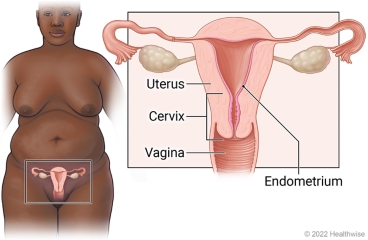
What is it?
An endometrial biopsy is a way for your doctor to take a small sample of the lining of the uterus (endometrium). The sample is looked at under a microscope for abnormal cells. An endometrial biopsy helps your doctor find problems in the endometrium.
Why is this test done?
An endometrial biopsy is done to check for abnormal cells in the lining of the uterus (endometrium). It checks for precancerous and cancerous cells. It may be done if you are at higher risk for uterine cancer or have symptoms of uterine cancer, such as abnormal bleeding from your uterus.
How do you prepare for the test?
- If you take aspirin or some other blood thinner, ask your doctor if you should stop taking it before your test. Make sure that you understand exactly what your doctor wants you to do. These medicines increase the risk of bleeding.
- Ask your doctor if you should take a pain reliever, such as ibuprofen (Advil or Motrin), 30 to 60 minutes before the test. This can help reduce any cramping pain that the test can cause.
How is the test done?
- You will lie on an exam table. Your feet will be in footrests.
- The doctor will use a tool called a speculum to see the cervix.
- The doctor may use a spray or injection to numb your cervix. The cervix is the opening to the uterus.
- Then the doctor will pass a thin tube through the cervix to take a sample of the uterus lining.
- The sample is sent to a lab.
What happens after the test?
- You will probably be able to go home right away.
- You likely will have mild vaginal bleeding and may have cramps for a few days after the test. The cramps may feel like menstrual cramps.
How can you care for yourself at home?
- Ask your doctor if you can take an over-the-counter pain medicine, such as acetaminophen (Tylenol), ibuprofen (Advil, Motrin), or naproxen (Aleve). Be safe with medicines. Read and follow all instructions on the label.
- Use pads for vaginal bleeding or discharge.
- You may return to all your usual activities (including sex) when you feel like it.
Follow-up care is a key part of your treatment and safety. Be sure to make and go to all appointments, and call your doctor if you are having problems. It's also a good idea to keep a list of the medicines you take. Ask your doctor when you can expect to have your test results.
Where can you learn more?
Go to http://www.healthwise.net/patientEd
Enter V957 in the search box to learn more about "Endometrial Biopsy: About This Test".
Current as of: May 5, 2025
Author: Ignite Healthwise, LLC Staff
Clinical Review Board
All Ignite Healthwise, LLC education is reviewed by a team that includes physicians, nurses, advanced practitioners, registered dieticians, and other healthcare professionals.

